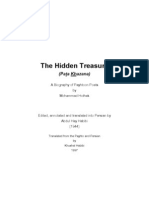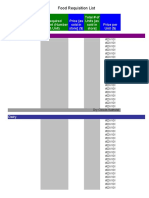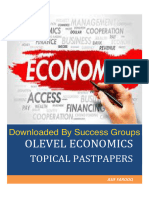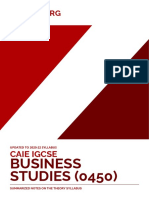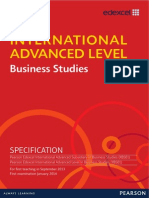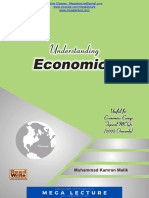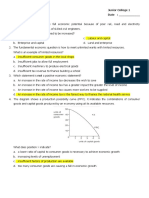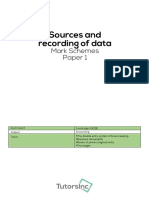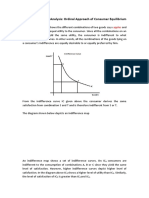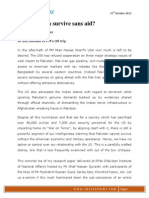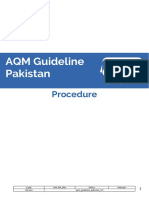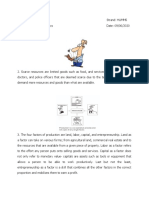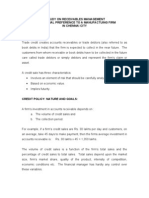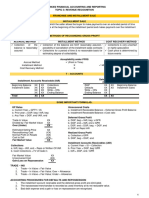O Level Economics Syllabus
Uploaded by
Mehreen KhurshidO Level Economics Syllabus
Uploaded by
Mehreen KhurshidSyllabus
Cambridge O Level Economics Syllabus code 2281 For examination in June and November 2013
Contents
Cambridge O Level Economics Syllabus code 2281
1. Introduction ..................................................................................... 2
1.1 Why choose Cambridge? 1.2 Why choose Cambridge O Level Economics? 1.3 How can I find out more?
2. Assessment at a glance .................................................................. 4 3. Syllabus aims and objectives ........................................................... 5
3.1 Aims 3.2 Assessment objectives
4. Curriculum content .......................................................................... 7 5. Resource list .................................................................................. 11 6. Additional information.................................................................... 13
6.1 6.2 6.3 6.4 6.5 6.6 Guided learning hours Recommended prior learning Progression Component codes Grading and reporting Resources
Cambridge O Level Economics 2281. Examination in June and November 2013. UCLES 2010
1. Introduction
1.1 Why choose Cambridge?
University of Cambridge International Examinations (CIE) is the worlds largest provider of international qualifications. Around 1.5 million students from 150 countries enter Cambridge examinations every year. What makes educators around the world choose Cambridge?
Developed for an international audience
International O Levels have been designed specially for an international audience and are sensitive to the needs of different countries. These qualifications are designed for students whose first language may not be English and this is acknowledged throughout the examination process. The curriculum also allows teaching to be placed in a localised context, making it relevant in varying regions.
Recognition
Cambridge O Levels are internationally recognised by schools, universities and employers as equivalent to UK GCSE. They are excellent preparation for A/AS Level, the Advanced International Certificate of Education (AICE), US Advanced Placement Programme and the International Baccalaureate (IB) Diploma. CIE is accredited by the UK Government regulator, the Office of the Qualifications and Examinations Regulator (Ofqual). Learn more at www.cie.org.uk/recognition.
Support
CIE provides a world-class support service for teachers and exams officers. We offer a wide range of teacher materials to Centres, plus teacher training (online and face-to-face) and student support materials. Exams officers can trust in reliable, efficient administration of exams entry and excellent, personal support from CIE Customer Services. Learn more at www.cie.org.uk/teachers.
Excellence in education
Cambridge qualifications develop successful students. They build not only understanding and knowledge required for progression, but also learning and thinking skills that help students become independent learners and equip them for life.
Not-for-profit, part of the University of Cambridge
CIE is part of Cambridge Assessment, a not-for-profit organisation and part of the University of Cambridge. The needs of teachers and learners are at the core of what we do. CIE invests constantly in improving its qualifications and services. We draw upon education research in developing our qualifications.
Cambridge O Level Economics 2281. Examination in June and November 2013.
1. Introduction
1.2 Why choose Cambridge O Level Economics?
International O Levels are established qualifications that keep pace with educational developments and trends. The International O Level curriculum places emphasis on broad and balanced study across a wide range of subject areas. The curriculum is structured so that students attain both practical skills and theoretical knowledge. Cambridge O Level Economics is recognised by universities and employers throughout the world as proof of knowledge and understanding. Successful Cambridge O Level Economics candidates gain lifelong skills, including: an understanding of economic theory, terminology and principles the ability to apply the tools of economic analysis the ability to distinguish between facts and value judgements in economic issues an understanding of, and an ability to use, basic economic numeracy and literacy the ability to take a greater part in decision-making processes in everyday life an understanding of the economies of developed and developing nations an excellent foundation for advanced study in economics.
In addition to Cambridge O Levels, CIE also offers Cambridge IGCSE and International A & AS Levels for further study. See www.cie.org.uk for a full list of the qualifications you can take.
1.3 How can I find out more?
If you are already a Cambridge Centre
You can make entries for this qualification through your usual channels, e.g. British Council or CIE Direct. If you have any queries, please contact us at [email protected].
If you are not a Cambridge Centre
You can find out how your organisation can become a Cambridge Centre. Email either your local British Council representative or CIE at [email protected]. Learn more about the benefits of becoming a Cambridge Centre at www.cie.org.uk.
Cambridge O Level Economics 2281. Examination in June and November 2013.
2. Assessment at a glance
Cambridge O Level Economics Syllabus code 2281
Candidates take two papers. Paper 1 Multiple choice Candidates answer forty multiple choice questions. All items are of the four response simple completion type. 30% of total marks Paper 2 Structured questions Candidates answer one compulsory question and three questions from a choice of six. 70% of total marks 2 hours 1 hour
Availability
This syllabus is examined in the May/June examination session and the October/November examination session. This syllabus is available to private candidates. International O levels are available to Centres in Administrative Zones 3, 4 and 5. Centres in Administrative Zones 1, 2 or 6 wishing to enter candidates for International O Level examinations should contact CIE Customer Services.
Combining this with other syllabuses
Candidates can combine this syllabus in an examination session with any other CIE syllabus, except: syllabuses with the same title at the same level 0455 IGCSE Economics
Please note that IGCSE, Cambridge International Level 1/Level 2 Certificates and O Level syllabuses are at the same level.
Cambridge O Level Economics 2281. Examination in June and November 2013.
3. Syllabus aims and objectives
3.1 Aims
The aims below describe the educational purposes of a course in economics for the O Level exam. The aims are to: 1 2 3 4 5 6 7 develop candidates knowledge and understanding of economic terminology, principles and theories; develop candidates basic economic numeracy and literacy and their ability to handle simple data including graphs and diagrams; develop candidates ability to use the tools of economic analysis in particular situations; show candidates how to identify and discriminate between differing sources of information and how to distinguish between facts and value judgements in economic issues; develop candidates ability to use economic skills (with reference to individuals, groups and organisations) to understand better the world in which they live; enable candidates to participate more fully in decision-making processes as both consumers and producers and as citizens of the local, national and international community; develop candidates understanding of the economies of developed and developing nations and of the relationships between them; and to develop their appreciation of these relationships from the perspective of both developed and developing nations.
Cambridge O Level Economics 2281. Examination in June and November 2013.
3. Syllabus aims and objectives
3.2 Assessment objectives
The three assessment objectives in Cambridge O Level Economics are: A: Knowledge with understanding B: Analysis C: Judgement and decision-making.
A:
1 2
Knowledge with understanding
show knowledge and understanding of economic facts, definitions, concepts, principles and theories; use economic vocabulary and terminology confidently.
Candidates should be able to:
B:
1 2 3
Analysis
select, organise and interpret data; apply economic knowledge and understanding in verbal, numerical, diagrammatic, pictorial and graphical form; use economic data, to recognise patterns in such data, and to deduce relationships.
Candidates should be able to:
C:
1 2 3 4 5
Judgement and decision-making
distinguish between evidence and opinion, make reasoned judgements and communicate those judgements in an accurate and logical manner; recognise that economic theory has various limitations and uncertainties; evaluate the social and environmental implications of particular courses of economic action; draw conclusions from economic information and critically evaluate economic data; communicate conclusions in a logical and concise manner.
Candidates should be able to:
Cambridge O Level Economics 2281. Examination in June and November 2013.
4. Curriculum content
4.1 Basic economic problem: choice and the allocation of resources
Candidates should be able to: define the nature of the economic problem (finite resources and unlimited wants); define the factors of production (land, labour, capital, enterprise); define opportunity cost and analyse particular circumstances to illustrate the concept; demonstrate how production possibility curves can be used to illustrate choice and resource allocation; evaluate the implications of particular courses of action in terms of opportunity cost.
4.2 The allocation of resources: how the market works; market failure
Candidates should be able to: describe the allocation of resources in market and mixed economic systems; demonstrate the principle of equilibrium price and analyse simple market situations with changes in demand and supply; describe the causes of changes in demand and supply conditions and analyse such changes to show effects in the market; define price elasticity of demand and supply and perform simple calculations; demonstrate the usefulness of price elasticity in particular situations such as revenue changes, consumer expenditure; evaluate the merits of the market system; describe the concept of market failure and explain the reasons for its occurrence; define private and social costs1 and benefits and discuss conflicts of interest in relation to these costs and benefits in the short-term and long-term through studies of the following issues: conserving resources versus using resources; public expenditure versus private expenditure.
Social costs are equal to the sum of private costs and external costs.
Cambridge O Level Economics 2281. Examination in June and November 2013.
4. Curriculum content
4.3 The individual as producer, consumer and borrower
Candidates should be able to: describe the functions of money and the need for exchange; describe the functions of central banks, stock exchanges, commercial banks; identify the factors affecting an individuals choice of occupation (wage factors and non-wage factors); describe likely changes in earnings over time for an individual; describe the differences in earnings between different groups of workers (male/female; skilled/unskilled; private/public; agricultural/manufacturing/services); describe trade unions and their role in an economy; describe the benefits and disadvantages of specialisation for the individual; analyse the different motives for spending, saving and borrowing; discuss how and why different income groups have different expenditure patterns (spending, saving and borrowing).
4.4 The private firm as producer and employer
Candidates should be able to: describe the type of business organisation in the public and private sectors: sole proprietors, partnerships, private limited companies, public limited companies, multinationals, co-operatives, public corporations; describe and evaluate the effects of changes in the structure of business organisations; describe what determines the demand for factors of production; distinguish between labour-intensive and capital-intensive production; define productivity and recognise the difference between productivity and production; define total and average cost, fixed and variable cost and perform simple calculations; analyse particular situations to show changes in total and average cost as output changes; define total and average revenue and perform simple calculations; describe the principle of profit maximisation as a goal and recognise that business organisations may have different goals; describe pricing and output policies in perfect competition and monopoly; describe the main reasons for the different sizes of firms (size of market, capital, organisation); describe and evaluate integration, economies and diseconomies of scale; discuss the advantages and disadvantages of monopoly.
Cambridge O Level Economics 2281. Examination in June and November 2013.
4. Curriculum content
4.5 Role of government in an economy
Candidates should be able to: describe the government as a producer of goods and services and as an employer; describe the aims of government policies, such as full employment, price stability, economic growth, redistribution of income, balance of payments stability; explain fiscal, monetary and supply-side policies; analyse the use of fiscal, monetary and supply-side policies; discuss the possible conflicts between government aims; describe the types of taxation (direct, indirect, progressive, regressive, proportional) and the impact of taxation; discuss the governments influence (regulation, subsidies, taxes) on private producers.
4.6 Economic indicators
With regards to prices candidates should be able to: describe how a consumer prices index/retail prices index is calculated; discuss the causes and consequences of inflation; discuss the causes and consequences of deflation.
With regards to employment candidates should be able to: describe the changing patterns and levels of employment; discuss the causes and consequences of unemployment.
With regards to output candidates should be able to: define Gross Domestic Product (GDP); define the term recession; describe and evaluate measures and indicators of comparative living standards, such as GDP per head, Human Development Index (HDI).
Cambridge O Level Economics 2281. Examination in June and November 2013.
4. Curriculum content
4.7 Developed and developing economies: trends in production, population and living standards
Candidates should be able to: describe why some countries are classified as developed and others are not; describe the difference between absolute and relative poverty; recognise and discuss policies to alleviate poverty; describe the factors that affect population growth (birth rate, death rate, fertility rate, net migration) and discuss reasons for the different rates of growth in different countries; analyse the problems and consequences of these population changes for countries at different stages of development; describe the effects of changing size and structure of population on an economy; discuss differences in standards of living within countries and between countries, both developed and developing.
4.8 International aspects
Candidates should be able to: describe the benefits and disadvantages of specialisation at regional and national levels; describe the structure of the current account of the balance of payments; discuss the causes and consequences of current account deficits and surpluses; define exchange rates; discuss the causes and consequences of exchange rate fluctuations; describe methods of trade protection; discuss the merits of free trade and protection.
Cambridge O Level Economics 2281. Examination in June and November 2013.
10
5. Resource list
This is NOT a list of prescribed texts, but provides a range of alternatives from which teachers may wish to choose. Author A.G. Anderton Title Economics for GCSE Includes data response questions (but not multiple choice). HIGCSE Economics Module 3 Covers Determining National Income, The Components of National Income and Factors Influencing National Income. Module 4 Covers Income, Growth and Development, Internal Development Concerns and Policies and International Development Concerns and Policies. Designed for a higher level examination taken in southern African countries but contains much material helpful for O Level. Economics for IGCSE Publisher Collins Education Cambridge University Press ISBN 0003274295
Matthew Andrews
9780521647779
9780521647762
Robert Dransfield, Terry Cook & Jane King Susan Grant
Nelson Thornes
9781408506578
IGCSE & O Level Economics
IGCSE & O Level Economics Workbook Barry Harrison & Brian Nutter Dan Moynihan & Brian Titley GCSE Economics Study Guide Economics: A Complete Course for IGCSE & O Level Economics: A Complete Course (3rd edition) Comprehensive topic coverage with assignments and data response material. Robert Paisley & John Quillfeldt GCSE Economics Divided into 38 units, each with activities including stepped questions and data response (but not multiple choice).
Cambridge University Press India Pvt Ltd Longman Oxford University Press
9780521720038
9780521144148 9780582315396 9780199151349 9780199134137
Longman Group UK
0582005205
Cambridge O Level Economics 2281. Examination in June and November 2013.
11
5. Resource list
John Pratten & N. Proctor Jason Probert
GCSE Economics HIGCSE Economics Module 1 Covers What is Economics? and Basic Economic Concepts. Module 2 Covers Supply and Demand, Firms and Production and Markets Designed for a higher level examination taken in southern African countries, but contains much material helpful for O Level. Economics IGCSE Revision Guide
Tudor Educational Cambridge University Press
9781872807737 9780521647793
9780521647786
Brian Titley & Helen Carrier
Oxford University Press
9780199154869
Resources are also listed on CIEs public website at www.cie.org.uk. Please visit this site on a regular basis as the Resource lists are updated through the year. Access to teachers email discussion groups, suggested schemes of work and regularly updated resource lists may be found on the CIE Teacher Support website at http://teachers.cie.org.uk. This website is available to teachers at registered CIE Centres.
Cambridge O Level Economics 2281. Examination in June and November 2013.
12
6. Additional information
6.1 Guided learning hours
O Level syllabuses are designed on the assumption that candidates have about 130 guided learning hours per subject over the duration of the course. (Guided learning hours include direct teaching and any other supervised or directed study time. They do not include private study by the candidate.) However, this figure is for guidance only, and the number of hours required may vary according to local curricular practice and the candidates prior experience of the subject.
6.2 Recommended prior learning
Candidates beginning this course are not expected to have studied Economics previously.
6.3 Progression
O Level Certificates are general qualifications that enable candidates to progress either directly to employment, or to proceed to further qualifications. Candidates who are awarded grades C to A* in O Level Economics are well prepared to follow courses leading to AS and A Level Economics, or the equivalent.
6.4 Component codes
Because of local variations, in some cases component codes will be different in instructions about making entries for examinations and timetables from those printed in this syllabus, but the component names will be unchanged to make identification straightforward.
6.5 Grading and reporting
Ordinary Level (O Level) results are shown by one of the grades A, B, C, D or E indicating the standard achieved, Grade A being the highest and Grade E the lowest. Ungraded indicates that the candidates performance fell short of the standard required for Grade E. Ungraded will be reported on the statement of results but not on the certificate.
Cambridge O Level Economics 2281. Examination in June and November 2013.
13
6. Additional information
6.6 Resources
Copies of syllabuses, the most recent question papers and Principal Examiners reports for teachers are available on the Syllabus and Support Materials CD-ROM, which is sent to all CIE Centres. Resources are also listed on CIEs public website at www.cie.org.uk. Please visit this site on a regular basis as the Resource lists are updated through the year. Access to teachers email discussion groups, suggested schemes of work and regularly updated resource lists may be found on the CIE Teacher Support website at http://teachers.cie.org.uk. This website is available to teachers at registered CIE Centres.
Cambridge O Level Economics 2281. Examination in June and November 2013.
14
University of Cambridge International Examinations 1 Hills Road, Cambridge, CB1 2EU, United Kingdom Tel: +44 (0)1223 553554 Fax: +44 (0)1223 553558 Email: [email protected] Website: www.cie.org.uk University of Cambridge International Examinations 2010
You might also like
- AQA Business 1-1-1-3 Workbook Answers 1No ratings yetAQA Business 1-1-1-3 Workbook Answers 135 pages
- Chapter 20 (5) : Variable Costing For Management AnalysisNo ratings yetChapter 20 (5) : Variable Costing For Management Analysis39 pages
- A Level Economics Synoptic Revision Mats Vol1 SampleNo ratings yetA Level Economics Synoptic Revision Mats Vol1 Sample6 pages
- Examiners' Report Principal Examiner Feedback October 2020No ratings yetExaminers' Report Principal Examiner Feedback October 202012 pages
- Chapter 7 External Economic Influences On Business ActivityNo ratings yetChapter 7 External Economic Influences On Business Activity3 pages
- Exemplar Coursework Project For Paper 2 PDFNo ratings yetExemplar Coursework Project For Paper 2 PDF64 pages
- (Ebook) Cambridge IGCSE and O Level: Economics by Paul Hoang, Margaret Ducie ISBN 9781510421271, 1510421270 2024 Scribd Download100% (5)(Ebook) Cambridge IGCSE and O Level: Economics by Paul Hoang, Margaret Ducie ISBN 9781510421271, 1510421270 2024 Scribd Download65 pages
- Olevels Economics Notes by Mudassir KarnolwaNo ratings yetOlevels Economics Notes by Mudassir Karnolwa86 pages
- 2019 Singapore-Cambridge A Level H2 Econs P2 Suggested Answer Key (9757)No ratings yet2019 Singapore-Cambridge A Level H2 Econs P2 Suggested Answer Key (9757)30 pages
- CIE IGCSE Unit 3.2 - Households - Spending, Borrowing and Saving - Miss PatelNo ratings yetCIE IGCSE Unit 3.2 - Households - Spending, Borrowing and Saving - Miss Patel32 pages
- A Level Economics (Macro) Notes by Calvin WongNo ratings yetA Level Economics (Macro) Notes by Calvin Wong21 pages
- Understanding Economics A2 Level FourthNo ratings yetUnderstanding Economics A2 Level Fourth467 pages
- AO1 Knowledge and Understanding Exercises and ActivitiesNo ratings yetAO1 Knowledge and Understanding Exercises and Activities9 pages
- CIE IGCSE Unit 3.3 - Workers - Occupations, Earnings and The Labour Market - Miss PatelNo ratings yetCIE IGCSE Unit 3.3 - Workers - Occupations, Earnings and The Labour Market - Miss Patel19 pages
- I T & D (E) : Mportant Erms Efinitions ConomicsNo ratings yetI T & D (E) : Mportant Erms Efinitions Conomics10 pages
- Sources and Recording of Data: Mark Schemes Paper 1No ratings yetSources and Recording of Data: Mark Schemes Paper 147 pages
- Cambridge International AS & A Level: BUSINESS 9609/04No ratings yetCambridge International AS & A Level: BUSINESS 9609/044 pages
- Reyhan Huseynova Activity 4.4 Business ManagementNo ratings yetReyhan Huseynova Activity 4.4 Business Management6 pages
- 0455 Scheme of Work (For Examination From 2020)No ratings yet0455 Scheme of Work (For Examination From 2020)46 pages
- IGCSE Economics Chapter 30 Key Concept - Macroeconomic ObjectivesNo ratings yetIGCSE Economics Chapter 30 Key Concept - Macroeconomic Objectives2 pages
- Cambridge Made a Cake Walk: IGCSE Accounting theory- exam style questions and answersFrom EverandCambridge Made a Cake Walk: IGCSE Accounting theory- exam style questions and answers2/5 (4)
- 31st OCT 2013 - Can Pakistan Survive Without US AidNo ratings yet31st OCT 2013 - Can Pakistan Survive Without US Aid4 pages
- THE Institute of Strategic Studies IslamabadNo ratings yetTHE Institute of Strategic Studies Islamabad5 pages
- Social Capital and Poverty Alleviation Some Qualitative Evidences From Lahore DistrictNo ratings yetSocial Capital and Poverty Alleviation Some Qualitative Evidences From Lahore District13 pages
- Are Pakistan 'S Nuclear Weapons Safe?: Malik Qasim MustafaNo ratings yetAre Pakistan 'S Nuclear Weapons Safe?: Malik Qasim Mustafa14 pages
- Economics by Manish Mishra: Basic Formulae of National Income AccountingNo ratings yetEconomics by Manish Mishra: Basic Formulae of National Income Accounting3 pages
- The Difference Between Real GDP and Nominal GDPNo ratings yetThe Difference Between Real GDP and Nominal GDP2 pages
- AFAR 03.3 - Franchise and Installment SalesNo ratings yetAFAR 03.3 - Franchise and Installment Sales2 pages






